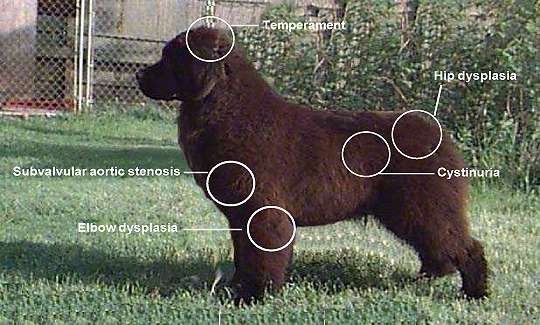
She's so cute and she looks perfectly healthy. But, she can't escape her genes or her early upbringing. Her mother has sub-valvular aortic stenosis and hip dysplasia. Her father has cystinuria. Neither of her parents were screened for these conditions prior to being bred and the chances are good that she has inherited these potentially fatal diseases. Additionally she has spent most of her short life having had little human contact and she is fearful and shy. Adorable yes, and a large heartache for her new family.
Newfoundlands, like all purebred dogs, are vulnerable to some extent to particular health problems, most of which also occur in other large and giant breed dogs. (Do not be misled into believing that mongrels are superior in this respect; they lack a basis on which the likelihood of hereditary disease can be evaluated.) Since these major health problems are not always outwardly evident in young dogs and have at least a modest genetic component, responsible breeders test (e.g., x-rays, blood tests) breeding stock prior to breeding.
No bloodline is absolutely free of all hereditary problems. In particular, the Newfoundland Club of America considers it necessary to test for four disorders (hip dysplasia, elbow dysplasia, cystinuria, and heart disease (particularly sub-aortic stenosis). Many breeders also test patellas, eyes, and thyroid. Only one of these, cystinuria, has a simple inheritance and a genetic test allowing breeders to completely avoid producing the disease. The others have complex inheritance in which there will be no complete guarantee that a puppy will not develop a problem as it grows into adulthood. Thus, in spite of pre-breeding clearances on both sire and dam, it is still possible that one or more of these diseases can occur.


There are several lessons to learn from information regarding health status. First, with the exception of cystinuria, breeders cannot give an absolute guarantee that these problems will not occur in the puppies they produce. Though the frequency varies, there are no “lines” in which these problems are completely absent. Breeders can, however, minimize the probability of seeing these problems in the puppies they produce by rigorous testing and reporting health test results.
Further, most breeders will have specific clauses in their contracts specifying the conditions for re- imbursement, etc., should a problem arise. Any puppy buyer is advised to discuss these issues with breeders, and breeders should be willing to openly discuss their breeding strategy and the status of their dogs. Health clearances of breeding dogs can be verified at the OFA (offa.org) and NCA (ncadatabase.org) websites. Remember that communication with the breeder is exceptionally important. If you can’t talk about it while you’re considering a puppy, it’s unlikely you’ll feel comfortable if a problem arises later on.